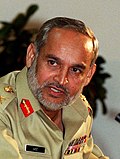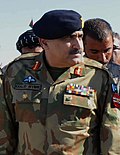| Chairman of the Joint Chiefs of Staff Committee | |
|---|---|
| صدرنشین مجلسِ مشترکہَ رؤسائے افواجِ پاکستان | |
 Flag of the Chairman Joint Chiefs of Staff Committee | |
| Type | Four-star officer |
| Status | Leader of the Armed Forces, Highest ranking military officer |
| Abbreviation | CJCSC |
| Member of | |
| Reports to | Minister of Defence |
| Residence | Islamabad, Pakistan |
| Seat | Joint Staff Headquarters Rawalpindi, Pakistan |
| Nominator | Prime Minister of Pakistan |
| Appointer | President of Pakistan |
| Term length | 3 years Renewable once |
| Precursor | Chief of Staff to the Commander in Chief of the Army, Navy and Air Force |
| Formation | 1 March 1976 |
| First holder | General Muhammad Sharif |
| Final holder | General Sahir Shamshad Mirza |
| Abolished | 27 November 2025 |
| Succession | Chief of Defence Forces |
The Chairman Joint Chiefs of Staff Committee (CJCSC) [a] was Pakistan's highest-ranking and senior most uniformed military officer, from 1976 to 2025, typically at four-star rank. The post was abolished under the 27th Constitutional Amendment in November 2025 and its functions were transferred to the newly created Chief of Defence Forces. [1] [2] The chairman served as the senior uniformed adviser to the Prime Minister of Pakistan, the President of Pakistan, and the National Security Council of Pakistan. The office directed inter-service coordination, joint strategic planning, capability development, and oversight of tri-service institutions including the Strategic Plans Division. Operational command remained with the individual service chiefs. [3] : 42 The chairman led the meetings and coordinated the combined efforts of the Joint Chiefs of Staff Committee (JCSC), comprising the chairman, the chief of the Army Staff, the chief of the Air Staff, the chief of the Naval Staff, the commandant of the marines, the director general of the Coast Guards and the Strategic Plans Division, and the commanders of the service branches in the Civil Armed Forces and the National Guard. [4] : 145–146
Contents
- Appointment preferences
- The last Chairman Joint Chiefs of Staff Committee
- List of Chairman Joint Chiefs of Staff Committee
- Chairman of the Joint Chiefs of Staff by Branch of Service
- See also
- Notes
- References
- External links
Even as the principal staff officer (PSO), the chairman did not have any authority over the command of the combatant forces. [5] : 145 The individual service chiefs were solely responsible for the coordination and logistics of the armed and combatant forces. Due to this constraint, the chiefs of the army, navy and air force remained in effective command and control of their respective commands. [5] : 146–147
The chairman's mandate was to transmit strategic communications to the combatant commanders from the prime minister and president as well as allocate additional funding to the combatant commanders if necessary. [5] : 146–147 The chairman was nominated and appointed by the prime minister and was finally confirmed by the president. [5] : 147 Unlike the United States’ Chairman of the Joint Chiefs of Staff, the appointment of the chairman did not require confirmation via a majority vote by the parliament. Instead, the appointment required approval from the prime minister. By statute, the chairman was appointed as a four-star general, four-star air chief marshal, and/or four-star admiral. By law, all four-star officers were required to have extensive experience in the joint uniformed services of Pakistan during their 40-year-long military careers. [5] : 148
The post of CJCSC was created by the former prime minister of Pakistan Zulfikar Ali Bhutto in March 1976, and the first chairman was four star rank officer, General Muhammad Shariff. A total of 18 officer held the office between 1976 and 2025, with Sahir Shamshad Mirza serving as the final CJCSC. [6] [7]













